北师大版(2019)必修第三册 Unit 7 Art Lesson 3 A Musical Genius 课件(共25张PPT)
文档属性
| 名称 | 北师大版(2019)必修第三册 Unit 7 Art Lesson 3 A Musical Genius 课件(共25张PPT) |
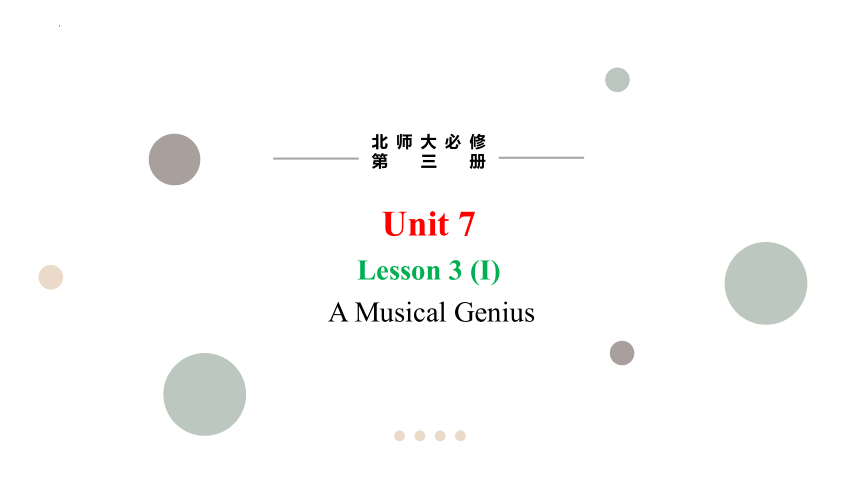
|
|
| 格式 | pptx | ||
| 文件大小 | 987.3KB | ||
| 资源类型 | 教案 | ||
| 版本资源 | 北师大版(2019) | ||
| 科目 | 英语 | ||
| 更新时间 | 2024-03-12 12:30:18 | ||
图片预览

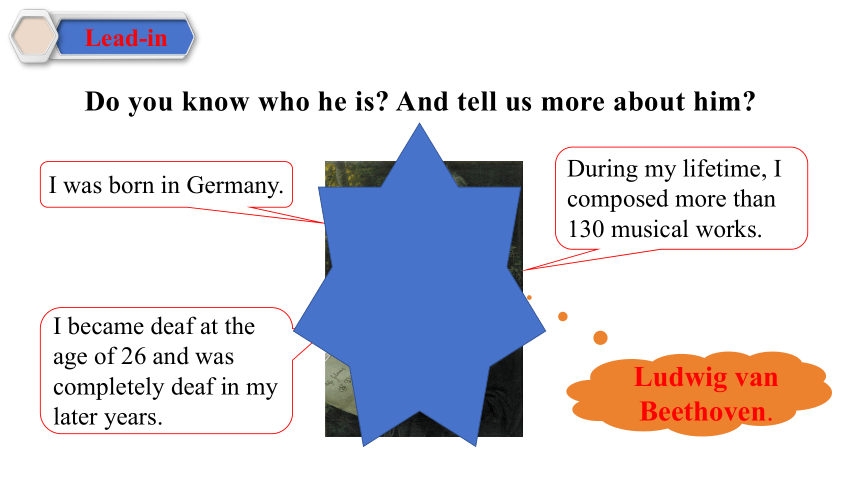
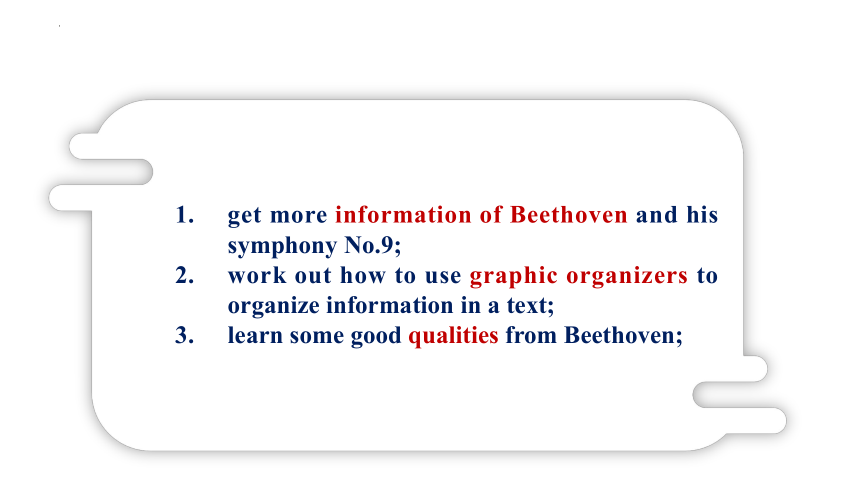

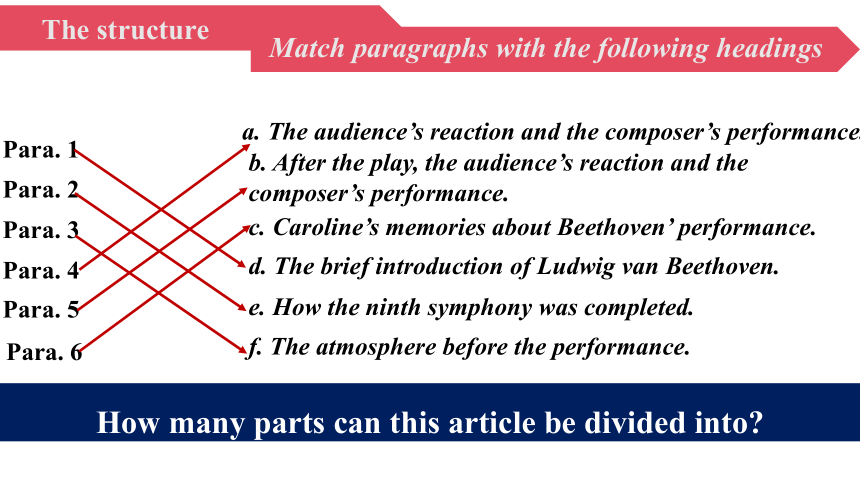
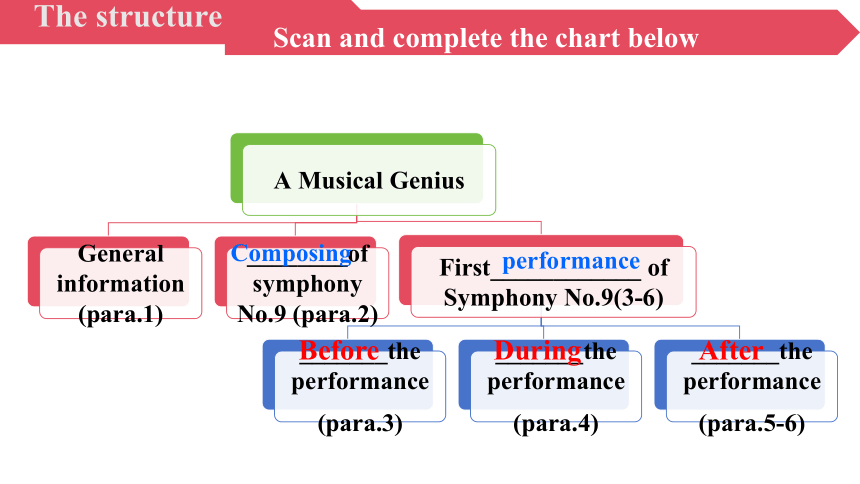
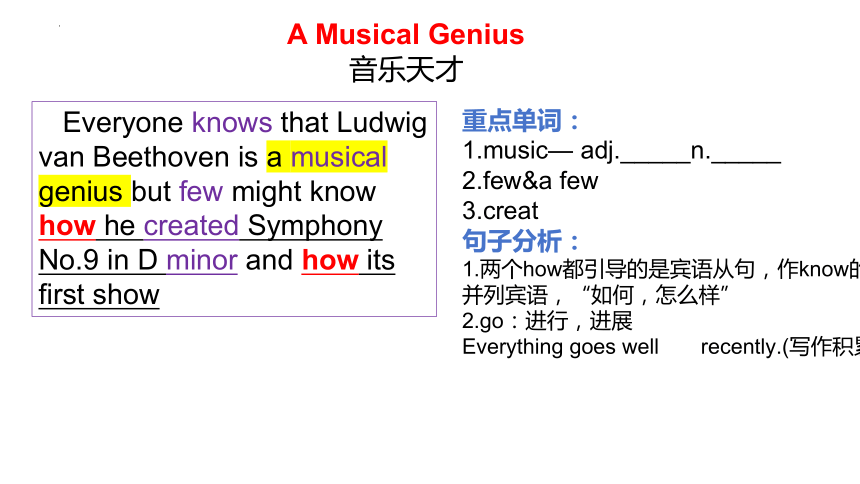
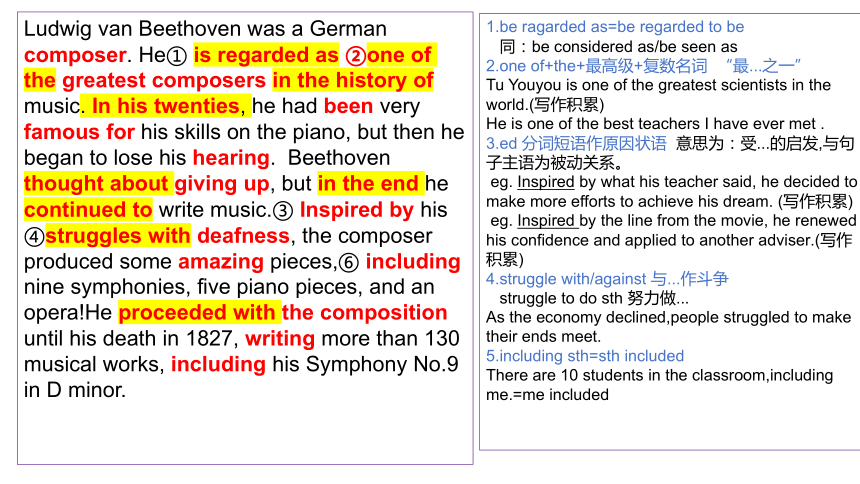

文档简介
(共25张PPT)
北师大必修
第三册
Unit 7
Lesson 3 (I)
A Musical Genius
教学目
Lead-in
Do you know who he is And tell us more about him
During my lifetime, I composed more than 130 musical works.
I became deaf at the age of 26 and was completely deaf in my later years.
I was born in Germany.
Ludwig van Beethoven.
get more information of Beethoven and his symphony No.9;
work out how to use graphic organizers to organize information in a text;
learn some good qualities from Beethoven;
What is the main idea of each paragraph
How many parts can this article be divided into
Task1: Skimming
Try to find out the answer
Para. 1
Para. 2
Para. 3
b. After the play, the audience’s reaction and the composer’s performance.
The structure
Match paragraphs with the following headings
Para. 4
Para. 5
Para. 6
d. The brief introduction of Ludwig van Beethoven.
c. Caroline’s memories about Beethoven’ performance.
e. How the ninth symphony was completed.
f. The atmosphere before the performance.
a. The audience’s reaction and the composer’s performance.
How many parts can this article be divided into
The structure
Scan and complete the chart below
Composing
performance
Before
During
After
Everyone knows that Ludwig van Beethoven is a musical genius but few might know how he created Symphony No.9 in D minor and how its first show
重点单词:
1.music— adj._____n._____
2.few&a few
3.creat
句子分析:
1.两个how都引导的是宾语从句,作know的并列宾语,“如何,怎么样”
2.go:进行,进展
Everything goes well recently.(写作积累)
A Musical Genius
音乐天才
Ludwig van Beethoven was a German composer. He① is regarded as ②one of the greatest composers in the history of music. In his twenties, he had been very famous for his skills on the piano, but then he began to lose his hearing. Beethoven thought about giving up, but in the end he continued to write music.③ Inspired by his ④struggles with deafness, the composer produced some amazing pieces,⑥ including nine symphonies, five piano pieces, and an opera!He proceeded with the composition until his death in 1827, writing more than 130 musical works, including his Symphony No.9 in D minor.
1.be ragarded as=be regarded to be
同:be considered as/be seen as
2.one of+the+最高级+复数名词 “最...之一”
Tu Youyou is one of the greatest scientists in the world.(写作积累)
He is one of the best teachers I have ever met .
3.ed 分词短语作原因状语 意思为:受...的启发,与句子主语为被动关系。
eg. Inspired by what his teacher said, he decided to make more efforts to achieve his dream. (写作积累)
eg. Inspired by the line from the movie, he renewed his confidence and applied to another adviser.(写作积累)
4.struggle with/against 与...作斗争
struggle to do sth 努力做...
As the economy declined,people struggled to make their ends meet.
5.including sth=sth included
There are 10 students in the classroom,including me.=me included
One day in February 1824, at his little house in Vienna, Austria, Ludwig van Beethoven sat back in his chair and smiled. The famous German composer’s ninth symphony was finally completed. Writing the piece had taken several years, and now the final notes had been added to the score. At 54 years of age, he didn’t know that this would be his last symphony. As he proudly signed his name at the bottom of the page, Beethoven tried to imagine how people would respond when they heard it for the first time.
1.note 音符,笔记 take notes
2.add...to...把...添加到...
be added to 被添加到...
3.score 乐谱,分数
4.that引导宾语从句做know的宾语,that在从句中不做任何成分,没有意义,在这里可以省略。
5.proudly ,proud ,pride
be proud of=take000000000 pride in 为...感到骄傲
6.at the bottom of 在...底部 反义词at the top of
7.how引导宾语从句做imagine后的宾语,how在从句中做方式状语,意为“如何”
8.for the first time在句子中做时间状语,首次,第一次
Before the performance, the backstage atmosphere at a very famous theatre in Vienna was tense. Beethoven ①was afraid that the performance would be a disaster. ②After all, what use is a conductor ③who could not hear his orchestra—④even if he is a musical genius
1.be afraid that害怕,担心,that引导宾语从句在句子中不做成分,没有意义
I'm afraid that I can't meet his expectations.
2.after all毕竟,终究
3.who引导定语从句,修饰先行词a conductor,在定语从句中做主语
4.even if=even though,即使,尽管,引导让步状语从句
The audience ①did not hesitate to applaud loudly as the famous composer walked out onto the stage for the first time in 12 years. The theatre’s musical director, Michael Umlauf, ②joined him and together the two men ③took charge of the orchestra. For more than an hour, Beethoven ④jumped about in front of the orchestra, waving his arms wildly in the air, and madly turning the pages of his score. The whole time, Umlauf ⑤stood quietly by his side, skillfully guiding the orchestra through the most amazing piece of music the world had ever known.
1.don't hesitate to do something,毫不犹豫做某事=do something without hesitation
eg. If you have any questions,don't hesitate to ask me.=ask me without any hesitation. (写作积累)
2.join sb 加入某人,和某人一起
3.take charge of 负责,指挥
4.jump about=jump around跳来跳去,waving, turning分词短语做伴随状语
(主+谓,+v-ing and v-ing.)
He patted me on the head, laughing and saying: “Believe yourself and you can make it !” (写作积累)
5.stand by one's side站在某人身旁,guiding分词短语作伴随状语
(主+谓,+v-ing )
As the final, joyous note signalled the end of the symphony, the audience jumped to their feet, clapping, cheering and waving their hats. But Beethoven continued conducting, his head buried in the score.It was not until Caroline Unger, one of the singers, took his arm and turned him to face the audience that the great man realised his symphony was a success.
1.as引导时间状语从句,意思是“随着...”
2.jump to one's feet,跳起来
clapping, cheering and waving分词短语作伴随状语,和句子的主语之间存在着主动关系
(主+谓,+v-ing,v-ing and v-ing.)
3.continue to do =continue doing 继续做某事
4.His head buried in the score是独立主格结构,用作伴随状语,转换成句子,应为and his head was buried in the score。
独立主格结构
Rewrite the sentences with non-finite verbs(非谓语动词)
1. The children jumped up and down with joy when they saw the big box.
Seeing the big box, the children jumped up and down with joy.
2. Mrs. Meredith came back and she was followed byBernard.
Mrs. Meredith came back, followed by Bernard.
3.She closed her eyes tightly and her hands covered her face.
1.I send you 100 dollars today, and the rest will followin a month.(完整的分句)
=I send you 100 dollars today, the rest to follow in a month.(独立主格结构)
2. He held the coins tightly, and tears rolled down without control.(完整的分句)
= He held the coins tightly, tears rollingdown without control.(独立主格结构)
3. They were surprised to find Mac's bicycle lying on the road and his tent bag was torn.(完整的分句)
=They were surprised to find Mac's bicycle lying on the road, his tent bag torn.(独立主格结构)
We explore
当出现两个动作,而前后两个动作逻辑主语不一致时,便可使用独立主格(主要动作为谓语动词,次要动作为非谓语动词)。
① She opened the letter, her hands ______ (tremble)with excitement.
② A boy stood by the door, his hands_____(cover)with dirt.
③ He stood there, tears of gratitude______(well) up in his eyes.
总结
It was not until Caroline Unger, one of the singers, took his arm and turned him to face the audience that the great man realised his symphony was a success.
1.a success 一个成功的人或一件成功的事
a failure 一个失败的人或一件失败的事儿
2. It is/was not until...that... 是一个强调句型,强调的是not until 引导的时间状语从句,意为“直到……才……”。
It was not until then that Mr Li realized the importance of health.
直到那时,李先生才意识到了健康的重要性
Later, Caroline remembered that Beethoven was not the only one who got a surprise. “The audience was shocked as well,” she said with a broad smile. “Most of them had no idea that he was deaf! The one person in the room who didn’t hear the symphony—and never would—was the very man who composed it.”
3.两个who引导的都是定语从句,在定语从句中做主语,修饰的先行词分别是the one person, the very man
very在此处表示强调,意思“正是,就是”
It's the very book I want to buy.
He is the very person I'm looking for. (写作积累)
Task 2: Intensive reading
Find evidence from the text
1. What was Beethoven thinking when he finished the symphony
2. How do you think Beethoven felt before and during the performance
3. What’s the response of the audience to Beethoven’s performance How do they feel
Scan and answer the questions
Time
Beethoven’s feeling
Evidence
During the performance
Before the performance
After finishing the symphony
proud, satisfied, happy, excited, relieved
___________and smiled,
proudly______his name
afraid, worried
concentrated, focused
Beethoven was_______…
what use …
jumped about, ______his arms, _______turned the pages … _______in the score
The feeling of the audience
shocked, content, absorbed
_________to their feet, clapping, cheering and waving their_______
Intensive reading
Answers
sat back
signed
afraid
waved
madly
buried
jumped
hats
Read the story. What can you find about Beethoven's composing of Symphony No. 9 and its first performance Use a graphic organiser to organise the information you find.
Beethoven
· General information
· Composing of Symphony No. 9
· Performance of Symphony No. 9
Task 3
Skill Builder
Graphic Organisers
Graphic organisers are a pictorial way of organising and illustrating information in a text. These include flow charts, tables and diagrams.
Determine the types of the text (e.g. narrative, argumentation, description or exposition).
Analyse the writing technique. Does the text include sequencing, facts and opinion, cause and effect Does it compare and contrast
Determine which type of graphic organiser will illustrate the text in the most effective way.
◆ It was his ______ symphony.
◆ Beethoven was afraid it would be __________.
◆ The musical director was __________________.
General information
◆ For more than _________, Beethoven jumped about in front of the orchestra, waving his arms wildly in the air, and madly turning _________________________.
◆ The symphony was a success, which gave Beethoven ________.
◆The audience were ________that Beethoven was deaf.
Performance of Symphony No. 9
◆ It took ______________ and was completed in February ______, in ________.
Composing of Symphony No. 9
last
1824
a disaster
Michael Umlauf
shocked
several years
Vienna
an hour
the pages of his score
a surprise
Post-reading
What qualities do you think made Beethoven “A Musical Genius”
diligent
creative
passionate
intelligent
courageous
persistent
Genius is the ability to put into effect what is in your mind.
——F. Scott Fitzgerald
By the end of the lesson, are you able to:
get more information of Beethoven and his symphony No.9?
work out how to use graphic organizers to organize information in a text?
learn some good qualities from Beethoven?
Self-assessment
Homework
Write a passage entitled
“ My understanding of genius”
with no more than 150 words
北师大必修
第三册
Unit 7
Lesson 3 (I)
A Musical Genius
教学目
Lead-in
Do you know who he is And tell us more about him
During my lifetime, I composed more than 130 musical works.
I became deaf at the age of 26 and was completely deaf in my later years.
I was born in Germany.
Ludwig van Beethoven.
get more information of Beethoven and his symphony No.9;
work out how to use graphic organizers to organize information in a text;
learn some good qualities from Beethoven;
What is the main idea of each paragraph
How many parts can this article be divided into
Task1: Skimming
Try to find out the answer
Para. 1
Para. 2
Para. 3
b. After the play, the audience’s reaction and the composer’s performance.
The structure
Match paragraphs with the following headings
Para. 4
Para. 5
Para. 6
d. The brief introduction of Ludwig van Beethoven.
c. Caroline’s memories about Beethoven’ performance.
e. How the ninth symphony was completed.
f. The atmosphere before the performance.
a. The audience’s reaction and the composer’s performance.
How many parts can this article be divided into
The structure
Scan and complete the chart below
Composing
performance
Before
During
After
Everyone knows that Ludwig van Beethoven is a musical genius but few might know how he created Symphony No.9 in D minor and how its first show
重点单词:
1.music— adj._____n._____
2.few&a few
3.creat
句子分析:
1.两个how都引导的是宾语从句,作know的并列宾语,“如何,怎么样”
2.go:进行,进展
Everything goes well recently.(写作积累)
A Musical Genius
音乐天才
Ludwig van Beethoven was a German composer. He① is regarded as ②one of the greatest composers in the history of music. In his twenties, he had been very famous for his skills on the piano, but then he began to lose his hearing. Beethoven thought about giving up, but in the end he continued to write music.③ Inspired by his ④struggles with deafness, the composer produced some amazing pieces,⑥ including nine symphonies, five piano pieces, and an opera!He proceeded with the composition until his death in 1827, writing more than 130 musical works, including his Symphony No.9 in D minor.
1.be ragarded as=be regarded to be
同:be considered as/be seen as
2.one of+the+最高级+复数名词 “最...之一”
Tu Youyou is one of the greatest scientists in the world.(写作积累)
He is one of the best teachers I have ever met .
3.ed 分词短语作原因状语 意思为:受...的启发,与句子主语为被动关系。
eg. Inspired by what his teacher said, he decided to make more efforts to achieve his dream. (写作积累)
eg. Inspired by the line from the movie, he renewed his confidence and applied to another adviser.(写作积累)
4.struggle with/against 与...作斗争
struggle to do sth 努力做...
As the economy declined,people struggled to make their ends meet.
5.including sth=sth included
There are 10 students in the classroom,including me.=me included
One day in February 1824, at his little house in Vienna, Austria, Ludwig van Beethoven sat back in his chair and smiled. The famous German composer’s ninth symphony was finally completed. Writing the piece had taken several years, and now the final notes had been added to the score. At 54 years of age, he didn’t know that this would be his last symphony. As he proudly signed his name at the bottom of the page, Beethoven tried to imagine how people would respond when they heard it for the first time.
1.note 音符,笔记 take notes
2.add...to...把...添加到...
be added to 被添加到...
3.score 乐谱,分数
4.that引导宾语从句做know的宾语,that在从句中不做任何成分,没有意义,在这里可以省略。
5.proudly ,proud ,pride
be proud of=take000000000 pride in 为...感到骄傲
6.at the bottom of 在...底部 反义词at the top of
7.how引导宾语从句做imagine后的宾语,how在从句中做方式状语,意为“如何”
8.for the first time在句子中做时间状语,首次,第一次
Before the performance, the backstage atmosphere at a very famous theatre in Vienna was tense. Beethoven ①was afraid that the performance would be a disaster. ②After all, what use is a conductor ③who could not hear his orchestra—④even if he is a musical genius
1.be afraid that害怕,担心,that引导宾语从句在句子中不做成分,没有意义
I'm afraid that I can't meet his expectations.
2.after all毕竟,终究
3.who引导定语从句,修饰先行词a conductor,在定语从句中做主语
4.even if=even though,即使,尽管,引导让步状语从句
The audience ①did not hesitate to applaud loudly as the famous composer walked out onto the stage for the first time in 12 years. The theatre’s musical director, Michael Umlauf, ②joined him and together the two men ③took charge of the orchestra. For more than an hour, Beethoven ④jumped about in front of the orchestra, waving his arms wildly in the air, and madly turning the pages of his score. The whole time, Umlauf ⑤stood quietly by his side, skillfully guiding the orchestra through the most amazing piece of music the world had ever known.
1.don't hesitate to do something,毫不犹豫做某事=do something without hesitation
eg. If you have any questions,don't hesitate to ask me.=ask me without any hesitation. (写作积累)
2.join sb 加入某人,和某人一起
3.take charge of 负责,指挥
4.jump about=jump around跳来跳去,waving, turning分词短语做伴随状语
(主+谓,+v-ing and v-ing.)
He patted me on the head, laughing and saying: “Believe yourself and you can make it !” (写作积累)
5.stand by one's side站在某人身旁,guiding分词短语作伴随状语
(主+谓,+v-ing )
As the final, joyous note signalled the end of the symphony, the audience jumped to their feet, clapping, cheering and waving their hats. But Beethoven continued conducting, his head buried in the score.It was not until Caroline Unger, one of the singers, took his arm and turned him to face the audience that the great man realised his symphony was a success.
1.as引导时间状语从句,意思是“随着...”
2.jump to one's feet,跳起来
clapping, cheering and waving分词短语作伴随状语,和句子的主语之间存在着主动关系
(主+谓,+v-ing,v-ing and v-ing.)
3.continue to do =continue doing 继续做某事
4.His head buried in the score是独立主格结构,用作伴随状语,转换成句子,应为and his head was buried in the score。
独立主格结构
Rewrite the sentences with non-finite verbs(非谓语动词)
1. The children jumped up and down with joy when they saw the big box.
Seeing the big box, the children jumped up and down with joy.
2. Mrs. Meredith came back and she was followed byBernard.
Mrs. Meredith came back, followed by Bernard.
3.She closed her eyes tightly and her hands covered her face.
1.I send you 100 dollars today, and the rest will followin a month.(完整的分句)
=I send you 100 dollars today, the rest to follow in a month.(独立主格结构)
2. He held the coins tightly, and tears rolled down without control.(完整的分句)
= He held the coins tightly, tears rollingdown without control.(独立主格结构)
3. They were surprised to find Mac's bicycle lying on the road and his tent bag was torn.(完整的分句)
=They were surprised to find Mac's bicycle lying on the road, his tent bag torn.(独立主格结构)
We explore
当出现两个动作,而前后两个动作逻辑主语不一致时,便可使用独立主格(主要动作为谓语动词,次要动作为非谓语动词)。
① She opened the letter, her hands ______ (tremble)with excitement.
② A boy stood by the door, his hands_____(cover)with dirt.
③ He stood there, tears of gratitude______(well) up in his eyes.
总结
It was not until Caroline Unger, one of the singers, took his arm and turned him to face the audience that the great man realised his symphony was a success.
1.a success 一个成功的人或一件成功的事
a failure 一个失败的人或一件失败的事儿
2. It is/was not until...that... 是一个强调句型,强调的是not until 引导的时间状语从句,意为“直到……才……”。
It was not until then that Mr Li realized the importance of health.
直到那时,李先生才意识到了健康的重要性
Later, Caroline remembered that Beethoven was not the only one who got a surprise. “The audience was shocked as well,” she said with a broad smile. “Most of them had no idea that he was deaf! The one person in the room who didn’t hear the symphony—and never would—was the very man who composed it.”
3.两个who引导的都是定语从句,在定语从句中做主语,修饰的先行词分别是the one person, the very man
very在此处表示强调,意思“正是,就是”
It's the very book I want to buy.
He is the very person I'm looking for. (写作积累)
Task 2: Intensive reading
Find evidence from the text
1. What was Beethoven thinking when he finished the symphony
2. How do you think Beethoven felt before and during the performance
3. What’s the response of the audience to Beethoven’s performance How do they feel
Scan and answer the questions
Time
Beethoven’s feeling
Evidence
During the performance
Before the performance
After finishing the symphony
proud, satisfied, happy, excited, relieved
___________and smiled,
proudly______his name
afraid, worried
concentrated, focused
Beethoven was_______…
what use …
jumped about, ______his arms, _______turned the pages … _______in the score
The feeling of the audience
shocked, content, absorbed
_________to their feet, clapping, cheering and waving their_______
Intensive reading
Answers
sat back
signed
afraid
waved
madly
buried
jumped
hats
Read the story. What can you find about Beethoven's composing of Symphony No. 9 and its first performance Use a graphic organiser to organise the information you find.
Beethoven
· General information
· Composing of Symphony No. 9
· Performance of Symphony No. 9
Task 3
Skill Builder
Graphic Organisers
Graphic organisers are a pictorial way of organising and illustrating information in a text. These include flow charts, tables and diagrams.
Determine the types of the text (e.g. narrative, argumentation, description or exposition).
Analyse the writing technique. Does the text include sequencing, facts and opinion, cause and effect Does it compare and contrast
Determine which type of graphic organiser will illustrate the text in the most effective way.
◆ It was his ______ symphony.
◆ Beethoven was afraid it would be __________.
◆ The musical director was __________________.
General information
◆ For more than _________, Beethoven jumped about in front of the orchestra, waving his arms wildly in the air, and madly turning _________________________.
◆ The symphony was a success, which gave Beethoven ________.
◆The audience were ________that Beethoven was deaf.
Performance of Symphony No. 9
◆ It took ______________ and was completed in February ______, in ________.
Composing of Symphony No. 9
last
1824
a disaster
Michael Umlauf
shocked
several years
Vienna
an hour
the pages of his score
a surprise
Post-reading
What qualities do you think made Beethoven “A Musical Genius”
diligent
creative
passionate
intelligent
courageous
persistent
Genius is the ability to put into effect what is in your mind.
——F. Scott Fitzgerald
By the end of the lesson, are you able to:
get more information of Beethoven and his symphony No.9?
work out how to use graphic organizers to organize information in a text?
learn some good qualities from Beethoven?
Self-assessment
Homework
Write a passage entitled
“ My understanding of genius”
with no more than 150 words
同课章节目录
- Unit 7 Art
- Lesson 1 Masterpieces
- Lesson 2 Beijing Opera
- Lesson 3 A Musical Genius
- Unit 8 Green living
- Lesson 1 Roots and Shoots
- Lesson 2 Greening the Desert
- Lesson 3 "White Bikes" on the Road
- Unit 9 Learning
- Lesson 1 Active Learning
- Lesson 2 Language Learning Tips
- Lesson 3 The Secrets of Your Memory
